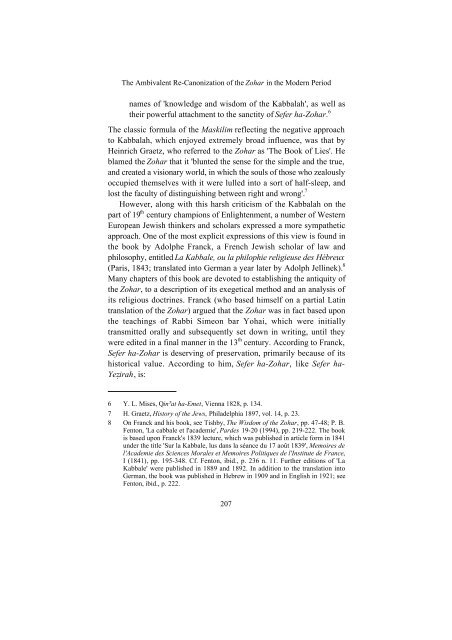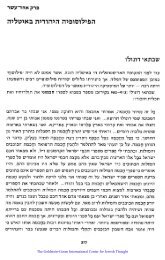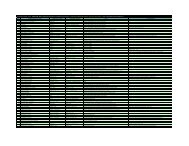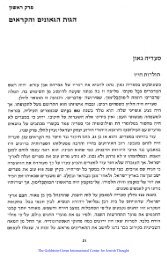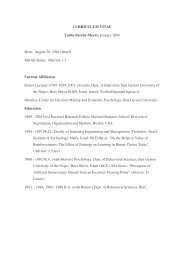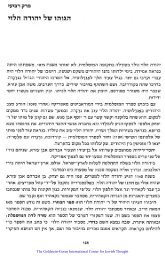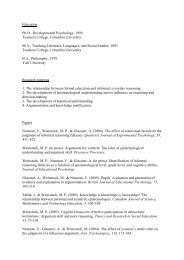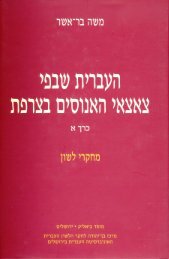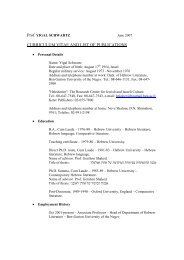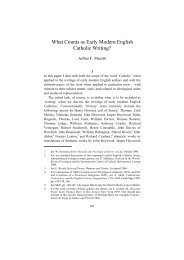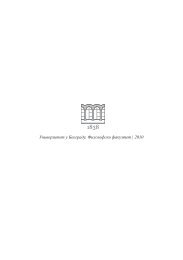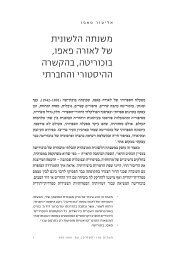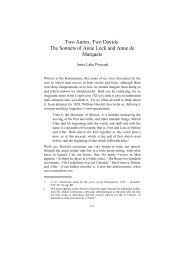Admiration and Disgust: The Ambivalent Re-Canonization of the ...
Admiration and Disgust: The Ambivalent Re-Canonization of the ...
Admiration and Disgust: The Ambivalent Re-Canonization of the ...
You also want an ePaper? Increase the reach of your titles
YUMPU automatically turns print PDFs into web optimized ePapers that Google loves.
<strong>The</strong> <strong>Ambivalent</strong> <strong>Re</strong>-<strong>Canonization</strong> <strong>of</strong> <strong>the</strong> Zohar in <strong>the</strong> Modern Period<br />
names <strong>of</strong> 'knowledge <strong>and</strong> wisdom <strong>of</strong> <strong>the</strong> Kabbalah', as well as<br />
<strong>the</strong>ir powerful attachment to <strong>the</strong> sanctity <strong>of</strong> Sefer ha-Zohar. 6<br />
<strong>The</strong> classic formula <strong>of</strong> <strong>the</strong> Maskilim reflecting <strong>the</strong> negative approach<br />
to Kabbalah, which enjoyed extremely broad influence, was that by<br />
Heinrich Graetz, who referred to <strong>the</strong> Zohar as '<strong>The</strong> Book <strong>of</strong> Lies'. He<br />
blamed <strong>the</strong> Zohar that it 'blunted <strong>the</strong> sense for <strong>the</strong> simple <strong>and</strong> <strong>the</strong> true,<br />
<strong>and</strong> created a visionary world, in which <strong>the</strong> souls <strong>of</strong> those who zealously<br />
occupied <strong>the</strong>mselves with it were lulled into a sort <strong>of</strong> half-sleep, <strong>and</strong><br />
lost <strong>the</strong> faculty <strong>of</strong> distinguishing between right <strong>and</strong> wrong'. 7<br />
However, along with this harsh criticism <strong>of</strong> <strong>the</strong> Kabbalah on <strong>the</strong><br />
part <strong>of</strong> 19 th century champions <strong>of</strong> Enlightenment, a number <strong>of</strong> Western<br />
European Jewish thinkers <strong>and</strong> scholars expressed a more sympa<strong>the</strong>tic<br />
approach. One <strong>of</strong> <strong>the</strong> most explicit expressions <strong>of</strong> this view is found in<br />
<strong>the</strong> book by Adolphe Franck, a French Jewish scholar <strong>of</strong> law <strong>and</strong><br />
philosophy, entitled La Kabbale, ou la philophie religieuse des Hébreux<br />
(Paris, 1843; translated into German a year later by Adolph Jellinek). 8<br />
Many chapters <strong>of</strong> this book are devoted to establishing <strong>the</strong> antiquity <strong>of</strong><br />
<strong>the</strong> Zohar, to a description <strong>of</strong> its exegetical method <strong>and</strong> an analysis <strong>of</strong><br />
its religious doctrines. Franck (who based himself on a partial Latin<br />
translation <strong>of</strong> <strong>the</strong> Zohar) argued that <strong>the</strong> Zohar was in fact based upon<br />
<strong>the</strong> teachings <strong>of</strong> Rabbi Simeon bar Yohai, which were initially<br />
transmitted orally <strong>and</strong> subsequently set down in writing, until <strong>the</strong>y<br />
were edited in a final manner in <strong>the</strong> 13 th century. According to Franck,<br />
Sefer ha-Zohar is deserving <strong>of</strong> preservation, primarily because <strong>of</strong> its<br />
historical value. According to him, Sefer ha-Zohar, like Sefer ha-<br />
YeΩirah, is:<br />
6 Y. L. Mises, Qin’at ha-Emet, Vienna 1828, p. 134.<br />
7 H. Graetz, History <strong>of</strong> <strong>the</strong> Jews, Philadelphia 1897, vol. 14, p. 23.<br />
8 On Franck <strong>and</strong> his book, see Tishby, <strong>The</strong> Wisdom <strong>of</strong> <strong>the</strong> Zohar, pp. 47-48; P. B.<br />
Fenton, 'La cabbale et l'academie', Pardes 19-20 (1994), pp. 219-222. <strong>The</strong> book<br />
is based upon Franck's 1839 lecture, which was published in article form in 1841<br />
under <strong>the</strong> title 'Sur la Kabbale, lus dans la séance du 17 août 1839', Memoires de<br />
l'Academie des Sciences Morales et Memoires Politiques de l'Institute de France,<br />
I (1841), pp. 195-348. Cf. Fenton, ibid., p. 236 n. 11. Fur<strong>the</strong>r editions <strong>of</strong> 'La<br />
Kabbale' were published in 1889 <strong>and</strong> 1892. In addition to <strong>the</strong> translation into<br />
German, <strong>the</strong> book was published in Hebrew in 1909 <strong>and</strong> in English in 1921; see<br />
Fenton, ibid., p. 222.<br />
207


